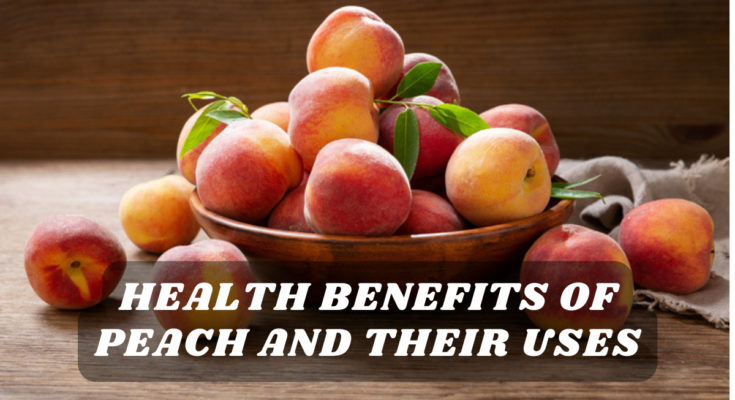PEACH (PRUNUS PERSICA)
Prunus persica is the scientific name for the peach tree. It is a deciduous tree that belongs to the Rosaceae family and is native to China. The peach tree is known for its juicy, sweet fruit, which is a popular ingredient in many dishes and desserts.
The peach tree can grow up to 25 feet tall and has a round crown of branches. It produces pink or white flowers in early spring, which are followed by fruit in the summer. The fruit has a fuzzy skin, a sweet yellow or white flesh, and a hard, oval-shaped pit in the center.
Peaches are rich in nutrients such as vitamins C and A, potassium, and dietary fiber. They are often eaten fresh, canned, or cooked in pies, jams, and other desserts. Peach trees are also valued for their ornamental qualities and are frequently planted in gardens and parks.
HEALTH BENEFITS
Peaches have several health benefits. Here are some of them:
1. Rich in nutrients: Peaches are a good source of vitamins A, C, and E, potassium, and dietary fiber.
2. Helps in digestion: The dietary fiber in peaches helps to keep the digestive system healthy, preventing constipation and other digestive problems.
3. Promotes skin health: The vitamins C and A in peaches help to maintain healthy skin, improve complexion, and reduce the signs of aging.
4. Supports immunity: The high content of vitamin C in peaches helps to strengthen the immune system and protect the body against infections.
5. Promotes heart health: Peaches contain potassium, which helps to regulate blood pressure and reduce the risk of heart disease.
6. Helps in weight loss: Peaches are low in calories and high in dietary fiber, making them an excellent addition to a weight loss diet.
7. Reduces inflammation: Peaches contain antioxidants that help to reduce inflammation in the body, which is linked to several chronic diseases.
Overall, including peaches in your diet can help improve your overall health and wellbeing.
USAGE:-
Peaches are a versatile fruit that can be used in many ways. Here are some ideas for how to use peaches:
1. Eating fresh: Simply wash the peach, remove the pit, and slice or bite into it for a refreshing snack.
2. Smoothies: Blend fresh peaches with yogurt, milk, or juice for a delicious and nutritious smoothie.
3. Salads: Add sliced peaches to your favorite salad for a sweet and juicy flavor.
4. Grilling: Brush peach halves with a little oil and grill them for a few minutes on each side for a caramelized, smoky flavor.
5. Baking: Use sliced peaches in pies, tarts, and cobblers, or add diced peaches to muffins, bread, and cake recipes.
6. Preserving: Make peach jam, chutney, or preserves to enjoy the fruit all year round.
7. Ice cream: Top your favorite ice cream with fresh peaches or make peach ice cream for a summer treat.
When choosing peaches, look for ones that are fragrant, slightly soft to the touch, and have a deep color. Peaches can be stored at room temperature until they are ripe, and then refrigerated for a few more days.
NUTRITIONAL VALUE OF PEACH
Peaches are delicious and nutritious fruits that provide a range of vitamins, minerals, and beneficial plant compounds. Here is the general nutritional profile of a medium-sized peach (approximately 150 grams):
- Calories: 60
- Carbohydrates: 14 grams
- Fiber: 2 grams
- Protein: 1 gram
- Fat: Less than 1 gram
- Vitamin C: 15% of the Daily Value (DV)
- Vitamin A: 6% of the DV
- Potassium: 8% of the DV
- Vitamin E: 5% of the DV
- Vitamin K: 5% of the DV
Peaches are low in calories and fat while providing a good amount of dietary fiber. They are also a good source of vitamin C, an essential antioxidant that helps protect the body’s cells, support the immune system, and promote collagen synthesis. Vitamin A, vitamin E, and vitamin K found in peaches also contribute to overall health and well-being.
Additionally, peaches contain small amounts of other nutrients such as magnesium, phosphorus, and niacin, among others. They are also rich in water content, making them hydrating and a good choice for maintaining proper hydration.
It’s important to note that the nutritional value of peaches may slightly vary depending on the variety and ripeness of the fruit.



